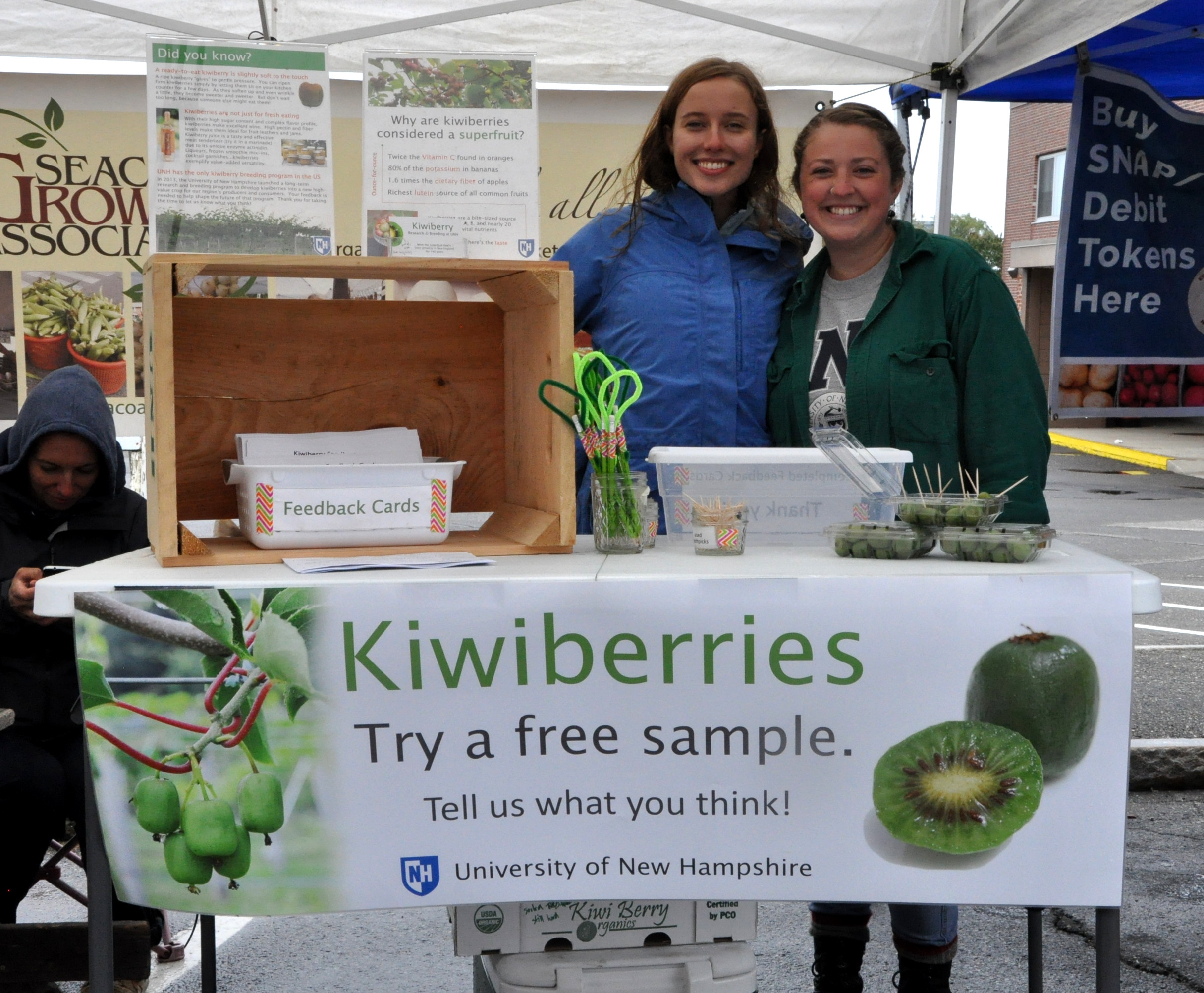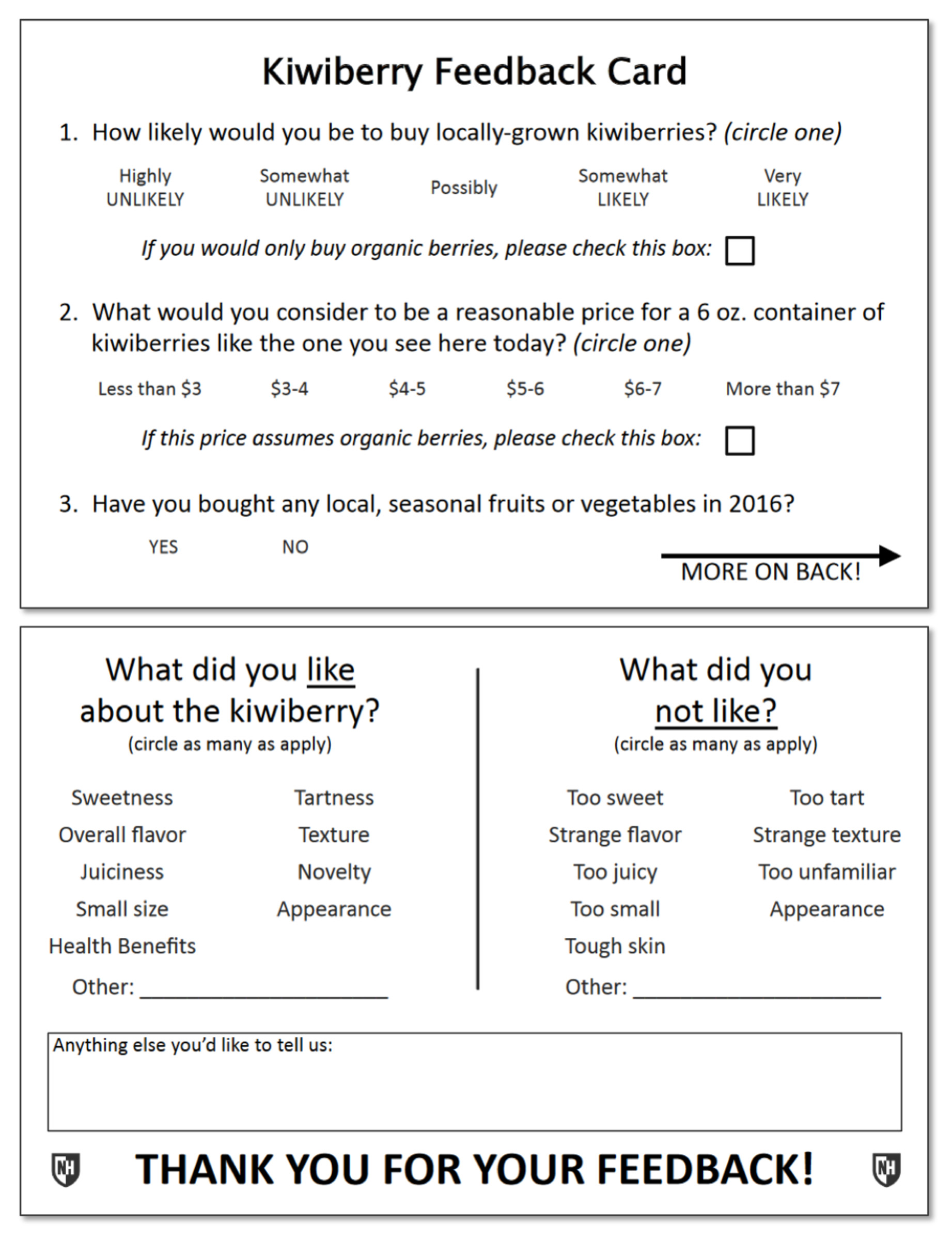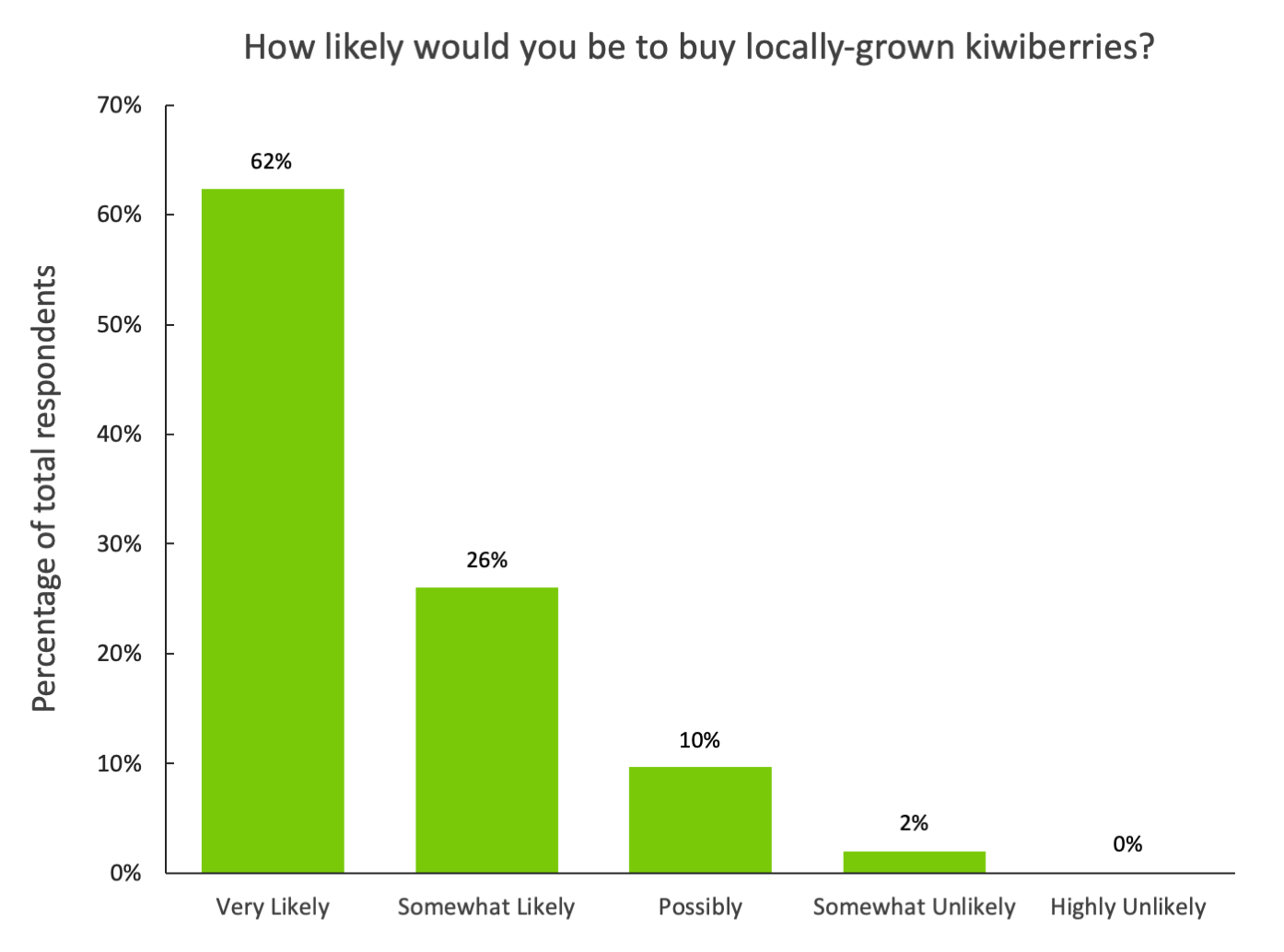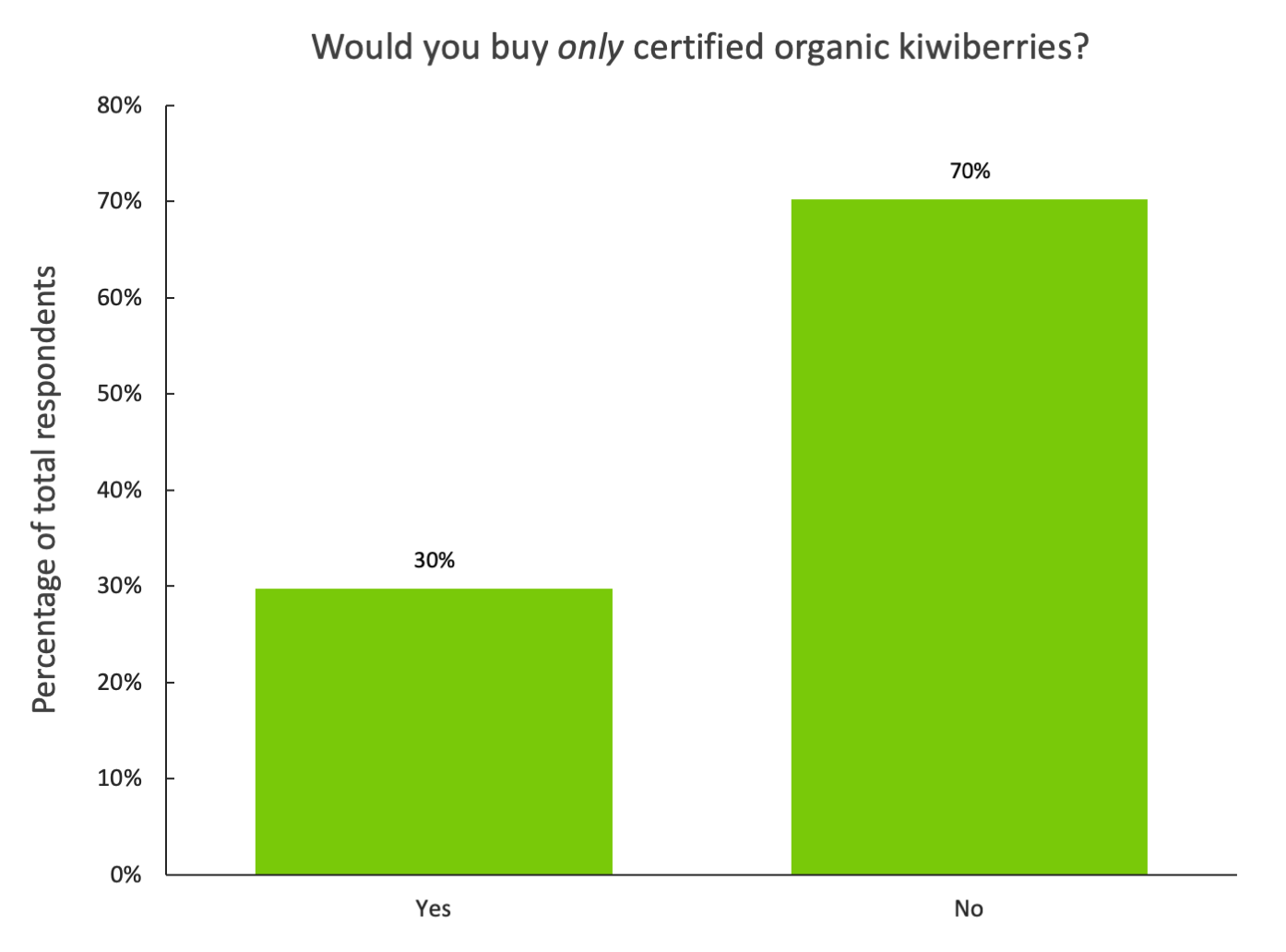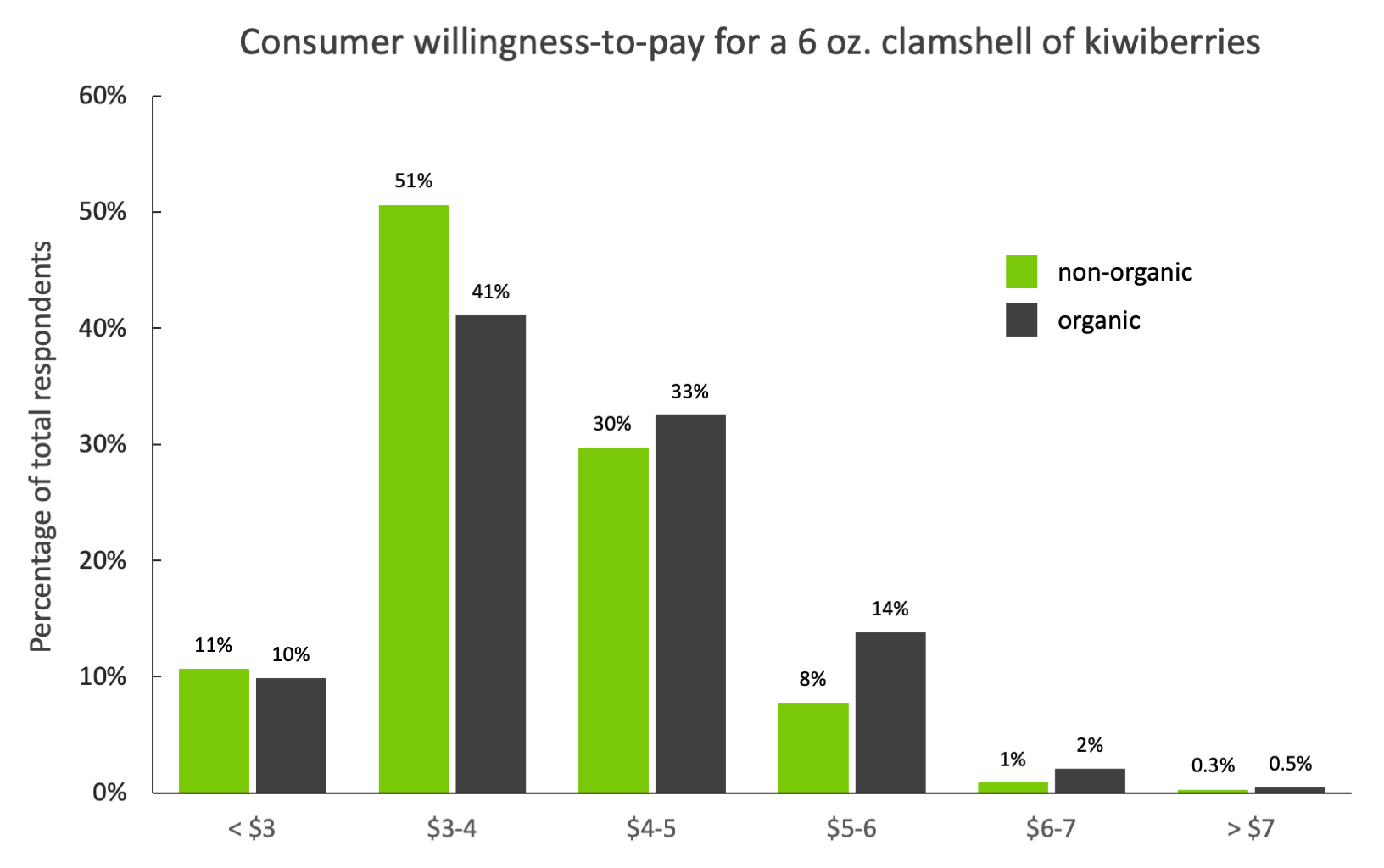Appendices
Appendix I
Grower resources
Appendix II
Federal import quarantine order for Pseudomomas syringae pv. actinidiae (Psa)
Appendix III
Statewide market analysis methodology and results
Appendix IV
Massachusetts Department of Agriculture (MDAR) decision letter (8/28/17)
Appendix V
Supplement on Actinidia kolomikta
Appendix VI
Areas of needed research
Appendix VII
Effects of harvest time and cold storage on the quality of berries of A. arguta cvs. ‘Ananasnaja’ and ‘Geneva 3’
Appendix VIII
Vineyard tasks, a seasonal timeline
Fig 1 The table set up at farmers markets for the survey.
Fig 2 The front (top) and back (bottom) of the kiwiberry response card presented to consumers during the market survey.
Fig 3 Consumer responses indicating likeliness to purchase kiwiberries grown in New England (NE).
Fig 4 Survey results summarizing consumer demand for organically produced kiwiberries.
Fig 5 The reported responses of NH farmers market consumers regarding their willingness to pay for a 6 oz. clamshell of kiwiberries.
APPENDIX III
Market analysis methodology and results
Methodology
Statistical Relevance To achieve the desired 95% confidence level (i.e. a 5-point confidence interval, or ±2.5% margin of error) in our determination of NH farmers market patrons’ demand for and willingness-to-pay for locally-grown kiwiberries, a minimum of 380 independent consumer responses were deemed necessary, based on the following estimates:
| Number of summer farmers markets in NH (Source: http://agriculture.nh.gov/divisions/agricultural-development/experience.htm) |
80 |
| Average weekly attendance per market (Northeast) (Source: 2006 USDA National Farmers Market Manager Survey) |
425 |
| Increase in attendance since 2006 | 20% |
| Average weekly attendance per market (2015 estimate) | 425 |
| Total farmers market shoppers per week | 34,000 |
| Target completed surveys (for 95% confidence; see http://www.resolutionresearch.com/results-calculate.html) |
380 |
Survey method One or two trained UNH students and/or faculty were deployed over the month of September 2016 to the following 22 area farmers markets:
| County | Markets |
| Carroll | Sandwich, Tamworth, Wakefield, Wolfeboro |
| Coös | Berlin, Colebrook |
| Grafton | Hanover, Lebanon, Lisbon, Littleton, Plymouth |
| Hillsborough | Bedford, Manchester, Merrimack, Nashua |
| Merrimack | Concord |
| Rockingham | Exeter, Portsmouth, Salem |
| Strafford | Dover, Durham |
| Sullivan | Newport |
At each market, a small table (Fig 1) was set up inviting market patrons to try a free kiwiberry sample and provide feedback. Interested consumers were offered one free sample kiwiberry on a toothpick (variety ‘Passion Poppers’, sourced from Kiwi Korners Farm in Danville, PA) and a short survey card to fill out (Fig 2). Consumers were also visually presented with a representative 6 oz. packed clamshell container for reference. Both tasting and completion of the survey were completely voluntary. In an effort to encourage response from a wide cross-section of the consumer population, the survey was advertised via social media and press releases in local and regional newspapers and media outlets.
Results
In total, we received 1,999 completed surveys; thus the minimum 95% confidence level was achieved. For example, if 62% of the survey respondents indicated they would be “very likely” to buy New England grown kiwiberries, the data allow us to extrapolate with confidence that approximately 60-64% of all NH farmers markets patrons would be very likely to buy New England grown kiwiberries.
Interest in kiwiberry The survey results indicate that the vast majority of NH farmers market consumers in New Hampshire are likely to buy locally grown kiwiberries, if they were available. Specifically, 62% responded that they would be “very likely”, and another 26% “somewhat likely,” to purchase New England grown kiwiberries (Fig 3). Not a single respondent indicated they would be “highly unlikely.”
Organic preference NH farmers market customers also by and large indicated New England grown kiwiberries need not be certified organic. Seventy percent (70%) would be willing to purchase locally-grown kiwiberries even if they were not certified organic (Fig 4).
Price sensitivity More than three-quarters of consumers indicated they would pay $3-5 for a 6 oz. clamshell of New England grown kiwiberries, whether certified organic or not, a price which equates to a retail value of $8-13 per pound. Less than 15% of the respondents felt kiwiberries were worth less than $3 per 6 oz. clamshell, and as many as 19% were willing to spend up to $8 per 6 oz. clamshell (Fig 5; Table 1).
Table 1 Average prices respondents were willing to pay for New England grown kiwiberries
| Method of production |
per 6 oz. clamshell |
per pound |
| Conventional |
$3.99 |
$10.64 |
| Certified organic |
$4.21 |
$11.23 |
|
Certified organic premium |
$0.22 |
$0.59 |

